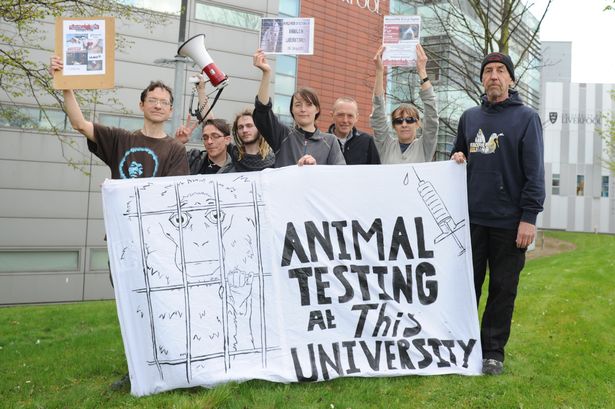
World Week of Action For Animals in Laboratories finished yesterday, 26 April. The wwaail.org website listed a number of events, most of them in the USA and connected to the No New Animal Lab campaign which is trying to stop the building of a $124 million animal laboratory at Washington University.
Saturday’s march drew hundreds of people and has been called “the largest grassroots animal liberation demo in the US in some time”. A report in The Seattle Times said: “500 animal-rights supporters marched across the University of Washington (UW) campus Saturday and temporarily blocked neighborhood streets.”
The following day saw many home demos against “key players” in the construction of the lab in Seattle. Home demos were outlawed in the UK in 2003 but they are still legal in America. There were also protests against the company building the lab, Skanska. One activist commented:
“In solidarity elsewhere (nationally and globally), activists had their own local office Skanska demos and office disruptions throughout the week. On Friday, UW lost a significant lawsuit against the activists legal team for secretly voting to build the lab. All of these combined factors electrified the mass protests onSaturday. And this was all grassroots!
Skanska is also the corporation behind the building a new facility for AstraZeneca in Cambridge. On Saturday a march in that city attracted about 300 people from all over the country. Cambridge University already uses 170,000 animals in cruel experiments every year and with planning approval for the new laboratory this looks set to rise steeply.
The march was organised by Cambridge AR, which is one of the oldest – if not the oldest – local group in the UK. Whether a sustained offensive will emerge from the protest remains to be seen. Since SPEAK failed to stop the building of a animal research lab in Oxford eight years ago, there have been a number of campaigns against universities who use animals, including Leicester, Cardiff and Newcastle, but none have lasted for more than a few months.
Finally I’d like to give a big shout out to Merseyside AR who organised a whole week of events including street stalls, a demo against Liverpool University and a day of action against charities who fund animal experiments, such as British Heart Foundation and Cancer Research UK.
The university protest received good coverage in the Liverpool Echo who reported:
Merseyside Animals Rights group staged a protest after learning through a Freedom of Information request the university carried out 14,753 experiments on animals in 2014.
The group said the animals used included mice, rats, rabbits and other rodents, chicken, sheep, cattle, horses, zebra fish and trout. The animals were used for biological, medical and veterinary research.
In a statement activists said: “1,451 of these experiments were classed as severe in terms of the pain and suffering inflicted on the animals. These severe experiments all involved mice or rabbits. Most other experiments inflicted mild to moderate pain and suffering.”
The university was forced to defend itself and used the same old cliches about animal use being “essential” and ensuring: “The number used is minimised and that procedures, care routines and husbandry are refined to maximise welfare as far as possible. Liverpool’s facilities for animals involved in research are among the best in the UK.”
Well done to MARC for their week of action and for putting Liverpool University under the spotlight and forcing them to account for their despicable actions. This is exactly what they want to avoid. All vivisectors wish for is to be left alone to continue with their grisly work. They hate having to justify what they do because it is unjustifiable.
No one can deny that opposing vivisection in the UK has not been easy in recent years. The failure to stop the Oxford Lab and the survival of Huntingdon Life Sciences, together with media-orchestrated smear campaigns and repressive laws targeting anti-vivisectionists, has led to a decline in morale and the numbers of activists.
MARC’s successful week of action shows the best way back could be through local groups targeting laboratories in their areas. As ever, it is decentralised grassroots campaigning that offers the best way of rebuilding the animal rights movement.